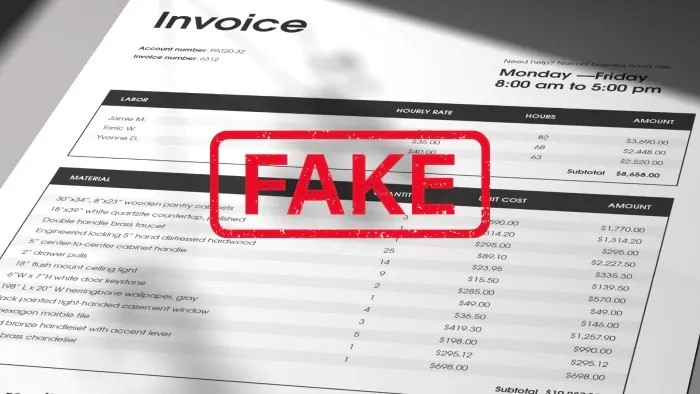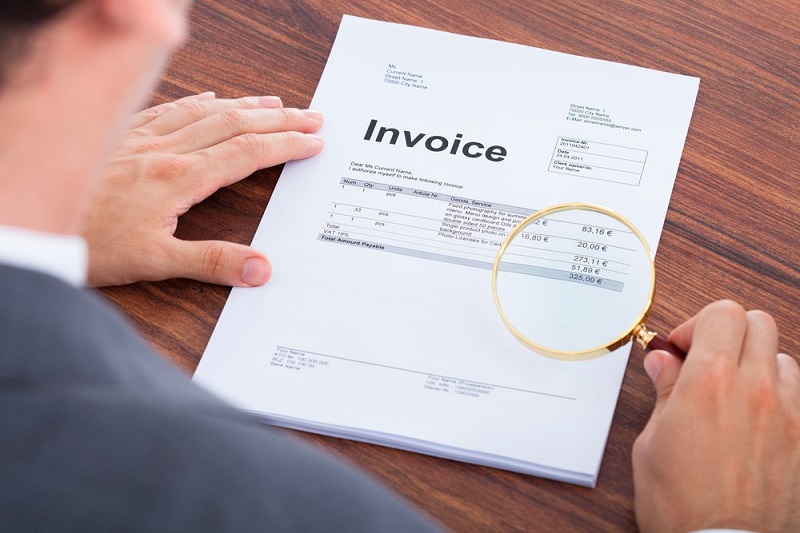Signs of violations in invoice management
Recently, the General Department of Taxation issued Official Dispatch 1873/TCT-TTKT dated June 1, 2022, focusing on enhancing reviews and inspections to identify taxpayers exhibiting indications of invoice risk and combating tax refund fraud. The attached Appendix to the official dispatch clearly outlines various signs and violations related to invoice management.
1. Using illegal invoices as prescribed in Clause 9, Article 3 of Decree No. 123/2020/ND-CP
Illegal invoices include:
- Fake invoice: is an invoice printed or created according to an invoice form that has been notified of issuance by another organization or individual, or printed or created with the same number of the same invoice symbol or a fake electronic invoice. electronic documents.
- Invoices and documents that are not yet valid or no longer valid;
- Invoices are stopped being used during the period of enforcement by stopping the use of invoices, except in cases where use is permitted according to the tax authority’s notice;
For instance, Unit A, having overdue taxes, was compelled to cease using invoices from May 12th of year X, specifically those numbered from 0001234 to 0009999. Invoices numbered from 0001234 and beyond, issued by the unit after May 12th, 2019, are all considered illegal.
- Electronic invoices are not registered for use with tax authorities;
- Electronic invoices do not have the tax authority’s code in case of using electronic invoices with the tax authority’s code;
Invoices for purchase of goods and services must be dated on the invoice from the date the tax authority determines that the seller is not operating at the business address registered with the competent state agency;
False Invoices. How to detect them, penalties and more
2. Illegal use of invoices according to the provisions of Clause 9, Article 3 of Decree No. 123/2020/ND-CP
Illegal use of invoices is the use of invoices in the following cases:
- Invoices that do not contain all required content or have incorrect information on the invoice according to regulations such as buyer and seller information (tax code, business address, etc.):
- Information about the buyer: missing or incorrect information about the buyer leads to the buyer not being able to use that invoice to declare purchased goods and services.
- Missing or incorrectly recording tax rates, tax amounts, or goods listed on the invoice are not of the correct specifications or quality. If this information is recorded incorrectly, it will lead to incorrect tax declaration declaration.
- Using false invoices (invoices containing indicators and contents of economic operations but the purchase and sale of goods and services are partially or completely bogus);
3. Invoicing at the wrong time
Details of the time of invoice issuance are specified in Article 9 of Decree 123/2020/ND-CP dated October 19, 2020. Invoicing at the wrong time can lead to incorrect declaration and payment of taxes.
For example: Company C produces air conditioners with a capacity of less than 90,000 BTU. On December 29, X sold a batch of 500 air conditioners to Business B (goods were delivered and Company B paid).
On January 5, X+1, Company C’s accountant just issued an invoice to declare VAT, special consumption tax for the period January X+1 and revenue from selling goods to calculate corporate income tax. declared in the tax period of year X+1.
However, according to the regulations on the time of invoice issuance, Company C must issue an invoice on December 29/X and declare VAT and special consumption tax on this invoice in the December/X period, sales revenue to Calculate corporate income tax declared in the tax period of year X.
Issuing invoices at the wrong time leads to incorrect information being declared on tax declarations and missing the tax amount payable (if any).
Every Organization Should Be Aware of Invoice Management
>>>Read more: The basic difference between tax examination and tax inspection
4. Cancel invoices that do not comply with regulations in Article 7 of Circular No. 78/2021/TT-BTC.
In cases where the seller issues an invoice upon receiving payment before or during the provision of a service as per regulations, and there is a cancellation or termination of the service provision, the seller must cancel the electronic invoice that was issued. However, common violations of the law on invoices include forgetting to notify the tax authority about the cancellation of the invoice using Form No. 04/SS-HDĐT, or notifying the tax authority but failing to cancel the invoice.
Electronic invoices have made it more convenient for businesses to manage and use compared to paper invoices, while also eliminating some cumbersome administrative procedures. However, if accountants are not careful in the management and use of invoices, it will still lead to violations of the law on management and use of electronic invoices and these violations will be handled according to the provisions of Decree 125/2020/ND-CP dated October 19, 2020.
Thus, readers need to master the regulations on electronic invoices, as well as the regulations on VAT rates to be able to prepare invoices with complete information and accurate content.
Smart Solutions For Business Company Limited(S4B Vietnam)
- Address: Unit 701B-701C, Tower A, Handi Resco, 521 Kim Ma Street, Ba Dinh District, Hanoi, Vietnam
- Tel: + 84 24 3974 4181
- Email: service@s4b.com.vn
——————————————–
We Will Show You The Way To Success!


